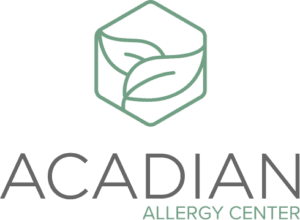SAME DAY APPOINTMENTS AVAILABLE NOW! CALL (337) 237-0650
Allergy Testing & Treatment
Trust the doctors at Acadian Allergy Center in Lafayette, LA for your allergy testing and treatment.
Residents of Southwest Louisiana are exposed to a broad spectrum of environmentally produced allergens. Pollen from trees and ragweed is often seen coating everything nearby in a yellow film. High humidity levels also produce mold-related allergens that can be troublesome. Allergies are rarely cured, but with proper diagnosis there are many medications, supplements, and treatment options available to help find relief from your symptoms.
We are a member of the American Academy of Otolaryngic Allergy. We attend continuing education courses regularly to keep our allergy staff educated with new information and industry innovations to benefit our patients. Recently, allergy testing methods have improved significantly and patients have more options than ever to relieve their allergy symptoms.

The Acadian Allergy Center is proud to offer comprehensive testing for an extensive array of allergens. Through a simple and virtually pain-free blood draw, we can test for many items at a time.
We take pride in being one of the few state-licensed labs accredited by both COLA and CLIA in our region. This accreditation not only sets us apart but also enables us to provide you with rapid and precise results right during your visit, eliminating the need for unnecessary waiting periods.
Immunotherapy
More than 50 million residents of the United States suffer from allergies today, according to the Centers for Disease Control and Prevention (CDC). Allergies rank sixth as a cause of chronic illness in this country, costing $18 billion annually. Immunotherapy is a process designed to pinpoint the source of allergies and alter the way the immune system responds to allergens, creating long-lasting relief from symptoms.
One of the primary ways to administer immunotherapy are through shots. Injections are used to expose the immune system to the reaction-causing substances in increasing amounts over time. This process increases the body’s tolerance to the allergen, significantly reducing symptoms like sneezing, wheezing, and itchy eyes. While immunotherapy typically takes years to complete, the positive benefits are long-lasting and can be permanent in some patients.
Our office has a quick process for getting our patients started with their allergy treatment and on the way to feeling better. Our patients check in using a kiosk system that escalates their appointments and allows most patients to be in and out. Allergy shots are a great option and normally the results are long-lasting.
If allergy shots are not right for you, we do offer other forms of immunotherapy such as sublingual drop. Our staff will sit down with you and go over all your options to find out what is best for you!
What is Sublingual Immunotherapy?
Sublingual immunotherapy or SLIT is a form of immunotherapy that involves placing drops of the allergen extracts under the tongue. This form of immunotherapy has been used for years in Europe and has recently increased use in the United States. A growing body of research supports both the efficacy and the safety of this treatment. This treatment is available at Acadian Allergy Center, offering our patients a convenient way to address their allergies when frequent shots are not a viable option.
At the beginning of the treatment, patients may continue to take allergy medication to control their symptoms as the benefits will not be seen immediately. However, most patients experience noticeable improvement within the first three to four months. Patients typically find they no longer require antihistamines to control their symptoms over time, as the drops build up sufficient immunity to keep symptoms at bay.
Cross Reactive Foods & Food Awareness
Please watch these foods the day before, day of and day after your allergy injection.
Certain foods have been reported as presenting problems during pollen season. Therefore, it may be advisable to rotate or eliminate the proven cross-reactive food from your diet during that specific time of the year. When the season is over, the foods may be introduced into the diet. Problems can occur shortly after exposure to the inhalant or up to several days later, thus making it difficult to track down the food culprit.
Remember, you are not allergic to these foods but consuming them can raise your overall allergy load and make you feel symptomatic. Many patients find that by simply watching these foods during their season, they feel better and are less reactive to their shots.
Louisiana Pollenating Season:
Trees: Late December – May
Grasses: May – September
Weeds: Late July – Winter Freeze
Dust Mites, Mold Spores, Animal Dander & Foods are Year Round Allergens: This means these allergens have no particular season. They remain all year long.
Dust and Dust Mites: Year Round Allergen
- Oysters, crab, scallops, lobster, shrimp, crawfish, pecans, peanuts, almonds, macadamia, cashews and many other tree nuts
Pecan Tree: December – May
- Corn, banana, wheat & wheat products
Cedar Tree: December – May
- Beef, baker’s & brewer’s yeast
Elm Tree: December – May
- Milk, milk products, cooking mint
Oak Tree: December – May
- Eggs, egg products, apples, chestnut
Cottonwood Tree: December – May
- Lettuce
Timothy, Bahia, Bermuda, Johnson Grass: May – September
- Grains: such as bread, oatmeal & rice.
- Apple, carrot, celery, cucumber, peas, beans, tomato, peanut, wheat, rye and soy.
- Cottonseed: such as salad oils, some mayonnaise, also used in stores on fruit to keep them shiny, also found in commercial frying and baking items such as cakes, breads, fish, popcorn, potato chips and doughnuts.
Giant Ragweed: July – First Winter Freeze
- Milk, cooking mint, cantaloupe, honeydew melon, watermelon, cucumber, banana, and lettuce
Short Ragweed: July – First Winter Freeze
- Wheat, wheat products, watermelon, cantaloupe, and banana
Rough Marsh Elder: July – First Winter Freeze
- Wheat, wheat products
Lamb’s Quarter: July – First Winter Freeze
- Corn, corn products and banana
Mold:
- When mold spores are elevated, which is year-round in our state, watch the amount of moldy type foods you consume in your diet.
Food & Beverages That May Cause Symptoms in Mold Allergic Patients:
- Alcoholic beverages, especially beer & wine
- Beets
- Buttermilk
- Breads
- Ketchup
- Cheese, especially aged, blue or cottage cheese
- Ciders
- Corned Beef
- Dried Fruits
- Canned Juices
- Mayonnaise & sour cream
- Mushrooms, olives, pickles
- Pizza – most allergenic cross-reactive food for mold allergies
- Relishes, Salad Dressings, Sauerkraut
- Tomatoes, especially canned
- Vinegar and foods containing vinegar
Suggestions:
Eat only freshly opened canned foods, meats, fresh or frozen vegetables. Buy fresh meat and freeze as soon as it is brought home. Avoid leftovers unless you freeze them. You can get the local pollen count for the day by visiting our website – acadianent.com or by going to pollen.com.
What to Expect on Your First Visit
Our resource center provides support to our patients and offers helpful information to make your experience as pleasant as possible. We have a number of patient information forms available for download, as well as pre- and post-operative surgery instructions, insurance providers and a list of frequently asked questions. Can’t find what you’re looking for? Give us a call and we’ll help you out.

TESTIMONIALS
All the doctors are very informative and caring. The staff is amazing as well! They make sure you understand everything, and they explain it in ways you can understand. They are very passionate at everything they do!
The team at Acadian ENT & Facial Plastic Surgery Center made my visit a very positive, informative & pleasant experience! The entire staff were welcoming & professional. My fear was taken from me by the knowledgeable information given me by the medical staff. I would highly recommend Acadian Ear, Nose, Throat & Facial Plastic Surgery Center to anyone in need of this type of medical care!
I get my allergy shots done here. Everyone is very professional and friendly. They get you in and out quickly and are great if you have any questions about your treatment! I can’t recommend them enough.
Every time I have an appointment here, they are Friendly, Professional, and go beyond trying to make you feel comfortable. But best of all they are absolutely the BEST!!!

Schedule an Appointment
*REQUIRED FIELDS
"*" indicates required fields


